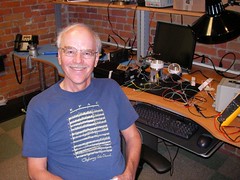Profile: Tommy Arends
August 10th, 2006 by Hugh
 Tommy describes himself as an “all purpose engineer”. He notes that you don’t see many job advertisements for someone with such a broad qualification. Usually employers are looking for someone to fill a specific role. Still, he believes there is real value in being able see the big picture, and find trade-offs between the hardware and the software. With the perspective arising from a background in mathematics and physics, Tommy has found more similarities between the disciplines than differences.
Tommy describes himself as an “all purpose engineer”. He notes that you don’t see many job advertisements for someone with such a broad qualification. Usually employers are looking for someone to fill a specific role. Still, he believes there is real value in being able see the big picture, and find trade-offs between the hardware and the software. With the perspective arising from a background in mathematics and physics, Tommy has found more similarities between the disciplines than differences.
Tommy is a freelance consultant who is helping Exbiblio with its hardware project. During his career, he’s had many jobs, both employed and freelance. His first job in 1969 was with a company that was trying to make a commercial success out of holography. It didn’t. Later he worked for a firm in Florida that was doing lots of things for the “secret guys” during the cold war. He moved to Texas to join Datapoint, one of the first companies to network computer terminals together. He saw the onset of IBM’s PC and a whiff of scandal destroy Datapoint’s value from $800m to next-to-nothing.
“I got to watch what happens when greed takes over in a company, and people start to do stupid things. Sometimes wealth and position don’t imply wisdom,” he says.
Another lesson for Tommy over the years has been that when the going gets tough for a company, the R&D people are the first out on the street, but he’s learned that he can survive the ups and downs of working in the technology industry.
Here in Seattle, Tommy has worked for the city’s richest and most famous son: Bill Gates. He was part of the team that developed the technology for Gates’s house. He worked on the tracking technology that follows people around the house. Among other things, it switches around the pictures on the walls. The spec for the project changed as Gates acquired a wife and child before the house was finished. He was present at some meetings with Gates and saw his style at first hand:
“He would ask a few narrowly focused question to make sure everybody was on their toes, provide a little bit of feedback, and then he got out of the way.”
Tommy says that the fast schedule of the Exbiblio project is fairly typical for a start up. As the deadline approaches for the first prototype of the scanner pen, Tommy predicts how it will turn out:
“I’ve seen it happen dozens of times. Everybody feels that it’s looking good. You’re on schedule. The parts come in. It looks nice and there are pretty pristine circuit boards. And then you turn it on and smoke comes out – that’s figurative smoke. Then usually there are several days of sleepless panic. You rummage through and find all the little things that are wrong – they are usually relatively minor problems, but they can be hard to find. Finally it works, but those circuit boards aren’t so pretty anymore and there’s a hole in the case where you don’t want it.”
A second version will clean up the major issues. A third will sort out some of the commercial problems, factoring in cost and making it practical to produce in large enough quantities: “That third generation is the one that you can have a reasonable expectation of being a successful product.”
As for the potential for Exbiblio’s product, Tommy says, “I think if we can get it out in the market place most of the anticipated uses will be greeted with “okay that’s nice”, and the one that really takes off will be thing that nobody ever thought about – that will be a surprise and it will be fun.”
Where Tommy thinks Exbiblio is more unusual is in its setting out of its corporate culture and values from day one: “Usually that happens by default and the company will take on the personality of the founder or the most dominant person. Here the corporate values seem to be set in place by design not default. That’s unusual for a company of this size where success may be some years away.”
Tommy interests include cycling (he pedals 11 miles into work) and chamber music. He and his wife both play early woodwind instruments, including the recorder, the crumhorn, and the rackett.
“When I was at college I found an old recorder lying around the house. I noodled on it, and still do. Playing chamber music is very satisfying when you are in the right group.” – hence the muscial notes on his t-shirt.
